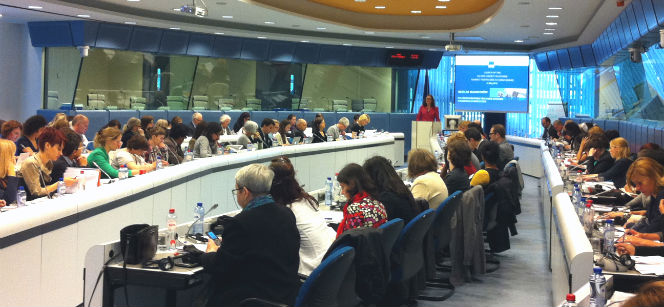


Accessibility tools
Service tools
Language selector
Navigation path
Left navigation
Additional tools
31 May 2013

Europe needs to work closer together to help the victims of today's slavery. Over 100 European civil society organisations are joining forces in the new EU Civil Society Platform against trafficking in human beings. The Europe-wide platform, set up by the European Commission, will serve as a forum for civil society organisations working at European, national and local levels.
Participants will be able to exchange experiences and concrete ideas on how to best assist victims, expand their networks, and prevent others from falling victims to this crime.
"The role of civil society is key in preventing trafficking in human beings and protecting its victims. Professionals and volunteers working on anti-trafficking issues, and directly with victims, can learn a lot from each other and can help us define concrete policies to fight this hideous crime. The platform will ensure that they receive the necessary support, from the EU and from each other, and that their knowledge is spread across Europe. We also hope to benefit from their knowledge in developing further EU policies", said EU Commissioner for Home Affairs, Cecilia Malmström, who also held a press conference after the launch (video).
The launching event, chaired by EU Anti-Trafficking Coordinator Myria Vassiliadou, included a panel of speakers from several EU Institutions and Agencies. The Commission will support the platform by organising regular meetings for participants, to gather crucial, up-to-date information and feedback on the main challenges that civil society organisations are facing on the ground. A second meeting of the platform is provisionally scheduled for the autumn.
During this first meeting ![]() , participants will reflect on the policy priorities and future activities of the platform, including possible awareness-raising activities, and ways to involve organisations based in countries outside the EU. They will also share and discuss good practices in tackling the recruitment of victims of trafficking and addressing demand on line.
, participants will reflect on the policy priorities and future activities of the platform, including possible awareness-raising activities, and ways to involve organisations based in countries outside the EU. They will also share and discuss good practices in tackling the recruitment of victims of trafficking and addressing demand on line.
New EU legislation in this field provides the backdrop for the meeting. The EU Anti-Trafficking directive focuses on preventing the crime, protecting the victims, prosecuting the traffickers. It covers actions in areas such as criminal law provisions, prosecution of offenders, victims' support and victims' rights in criminal proceedings. To date, only 9 countries have fully transposed the directive into national law (Czech Republic, Sweden, Estonia, Latvia, Lithuania, Hungary, Poland, Romania and Finland) and 4 countries have partially transposed (Belgium, Bulgaria, Slovenia and UK).
At a time when growing numbers of victims are being identified in the EU, the 2012 EU Strategy sets out 40 concrete initiatives, including strengthening the role of civil society.
Rad Commissioner Malmströms speech at the launch event. A full list of the organisations participating from each EU country is available here ![]() . For more information about the EU directive, visit the EU anti-trafficking website. Op-ed: Stop stalling, EU states
. For more information about the EU directive, visit the EU anti-trafficking website. Op-ed: Stop stalling, EU states